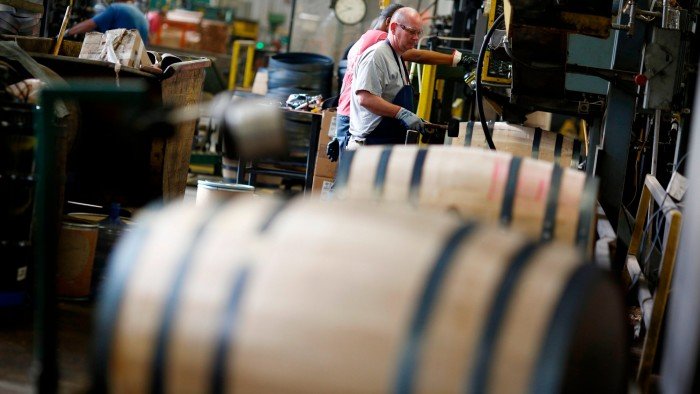Unlock the Editor’s Digest for free
Roula Khalaf, Editor of the FT, selects her favourite stories in this weekly newsletter.
Excessive alcohol is bad for your investment returns as well as your health. Once considered a defensive staple, shares of the biggest alcoholic drinks makers have lost their allure. Across large parts of the developed world, people — particularly younger consumers — are drinking less. It is not just Gen Z’s idiopathic indifference. Weight-loss drugs and the growing legalisation of cannabis in the US may also be tempering alcohol intake.
The downturn has been most noticeable among producers of wine and spirits. Shares in Diageo, maker of Johnnie Walker Scotch whisky, have lost more than 50 per cent in value since the start of 2022, while Brown-Forman, with its Jack Daniel’s Tennessee whiskey, is down two-thirds from its 2020 peak. The latter last week warned that organic net sales and operating income will decline for the current fiscal year. Constellation Brands, which sells Modelo and Corona beer in the US, took a $2.8bn impairment on its wine and spirits business in its most recent fiscal year and has warned that organic net sales of wine and spirits could fall another 20 per cent this year.
Even French luxury goods conglomerate LVMH has not been immune to this trend. Analysts are increasingly coalescing around the idea that the company, which is trading at a discount to luxury peers, should consider spinning out Moët Hennessy, its struggling wine and spirits unit, in order to improve its valuation.
Amid the gloom, there are some bright spots. Developing markets, led by India, Brazil, Mexico and South Africa, are expected to drive a $28bn increase in alcohol sales over the next decade, according to the IWSR, the research consultancy. AB InBev, the maker of Stella Artois and Budweiser, generates about half of its sales and profit from Central and South America. Its shares are up 40 per cent so far this year. That compares to the 10 per cent decline seen in the shares of more US-focused brewer Molson Coors.
Non-alcoholic beer also offers hope for the industry. While the market is still in its infancy, sales are soaring. In the US, volume for the category grew at a compound annual rate of 22 per cent between 2019 and 2024, versus a decline of 3 per cent for alcoholic beer, according to the IWSR. Heineken, the Dutch brewing giant, is among those that has made a big push in this direction. For the industry as a whole, however, the move into non-alcoholic drinks will take time before it can meaningfully improve revenues and profits.
The stocks of distillers such as Brown-Forman and Diageo are still trading at about 16 times forward earnings. While that is down from their three-year averages, the multiple reflects residual hopes their business will, over time, return to growth. That looks increasingly improbable. Dry January is turning into a year-round phenomenon.
pan.yuk@ft.com

